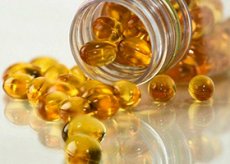Medical expert of the article
New publications
Epilepsy could be treated with fish oil
Last reviewed: 02.07.2025

All iLive content is medically reviewed or fact checked to ensure as much factual accuracy as possible.
We have strict sourcing guidelines and only link to reputable media sites, academic research institutions and, whenever possible, medically peer reviewed studies. Note that the numbers in parentheses ([1], [2], etc.) are clickable links to these studies.
If you feel that any of our content is inaccurate, out-of-date, or otherwise questionable, please select it and press Ctrl + Enter.

Fish oil can be of great help in the fight against epilepsy.
According to the results of a new experiment, scientists have found that docosahexaenoic acid can reduce the frequency of seizures in rodents by increasing the level of estrogen in the brain.
In addition to the anticonvulsant activity of fish oil, experts were able to prove the presence of synergism between the said acid and estrogens. Details of the study are described in the Scientific Reports publication by Japanese professor Yasuhiro Ishihara.
Epilepsy is classified as a chronic neuropathology, in which the main symptom is seizures caused by increased activity of nerve cells. Pharmacists offer a lot of drugs to correct the condition of a patient with epilepsy, but only 70% of patients show a stable therapeutic effect.
Western medical experts have long had information that one of the main female hormones, estrogen, can influence seizure activity. However, the specific effect of estrogen on the course of epilepsy has not yet been described.
Several years ago, doctors noticed that omega-3 fatty acids had a certain anticonvulsant effect. Thus, the fat of herring, mackerel and salmon fish led to a decrease in the frequency of convulsions.
To finally confirm or refute this information, the Japanese decided to study in detail the properties of fish oil.
Experiments were conducted on rodents that were given certain dietary changes for 28 days.
The first group of rodents was offered food based on soy fat, the second group was given food with flaxseed oil, and the third group was given fish oil supplements.
At the end of the experiment, the animals were given drugs that provoked seizures. It was found that the rodents that followed a diet based on fish oil felt best.
Dr. Ishihara went further: he examined the estrogen levels in the brains of mice. He noted that soybean oil led to an increase in estrogen levels almost twofold, compared to those mice that consumed flaxseed oil. The specialist was surprised, but the group that took fish oil had the highest values.
The results of the study showed that high levels of estrogen counteract the occurrence of seizures, and fish oil and the acid it contains influence the increase in the amount of estrogen, providing anticonvulsant activity.
These findings were confirmed twice: the scientists conducted the following experiment, adding an anti-estrogen drug, Letrozole, to all the rodents. After the injection of Letrozole, the guesses were confirmed: the animals became more susceptible to seizures.
The specialists have published the results of their experiments and sincerely hope that the components of fish oil will be actively used in the treatment of convulsive syndrome. The next tests, which scientists are already preparing, are clinical experiments involving people suffering from epilepsy.


 [
[